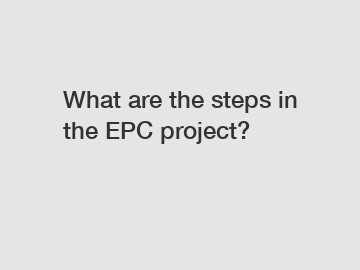What are the steps in the EPC project?
Google Hot Topics: .
1. Importance of EPC projects in the construction industry .
2. Key steps in executing an EPC project .

3. Common challenges faced during EPC projects .
4. Best practices for successful EPC project management .
What are the steps in the EPC project?
When embarking on an EPC (Engineering, Procurement, and Construction) project, there are several key steps that need to be followed to ensure its successful completion. EPC projects are complex undertakings that require careful planning, coordination, and execution. By following a systematic approach, project managers can effectively manage the various aspects of the project and deliver it on time and within budget. In this article, we will discuss the steps involved in an EPC project and provide some insight into best practices for successful project management.
1. Define project scope and objectives: The first step in any EPC project is to clearly define the scope and objectives of the project. This involves identifying the overall goal of the project, as well as the specific deliverables that need to be achieved. By clearly outlining the project scope, project managers can ensure that all stakeholders are on the same page and that expectations are managed effectively.
2. Develop a project plan: Once the project scope and objectives have been defined, the next step is to develop a detailed project plan. This plan should outline the tasks, milestones, and deadlines associated with the project, as well as the resources needed to complete it. A well-developed project plan is essential for ensuring that the project stays on track and that potential risks are identified and addressed proactively.
3. Procure necessary resources: The procurement phase of an EPC project involves sourcing and acquiring the resources needed to complete the project. This may include hiring contractors, purchasing materials, and securing equipment. It is important for project managers to carefully manage the procurement process to ensure that resources are acquired in a timely and cost-effective manner.
4. Execute the project: With the project plan in place and the necessary resources secured, the next step is to execute the project. This involves coordinating the activities of various stakeholders, monitoring progress, and resolving any issues that may arise. Effective communication and collaboration are key during this phase to ensure that the project stays on track and that any deviations from the plan are addressed promptly.
5. Monitor and control the project: Throughout the course of the project, it is important for project managers to monitor progress and control for any deviations from the plan. This may involve tracking key performance indicators, conducting regular status updates, and conducting risk assessments. By monitoring and controlling the project effectively, project managers can identify potential issues early on and take corrective action to keep the project on track.
6. Close out the project: Once the project has been completed, the final step is to close out the project. This involves conducting a thorough assessment of the project's performance, documenting lessons learned, and transitioning any remaining tasks or deliverables to the appropriate stakeholders. By properly closing out the project, project managers can ensure that the project is formally completed and that any loose ends are tied up.
In conclusion, EPC projects are complex undertakings that require careful planning and execution. By following a systematic approach and adhering to best practices for project management, project managers can successfully navigate the various steps involved in an EPC project and deliver it on time and within budget. By defining project scope and objectives, developing a project plan, procuring necessary resources, executing the project, monitoring and controlling progress, and closing out the project, project managers can effectively manage the various aspects of an EPC project and ensure its success.
For more information, please visit LPG Bobtail Truck with pump, LPG Solution supplier, LPG Storage Tank manufacturer.
221
0
0

Comments
All Comments (0)